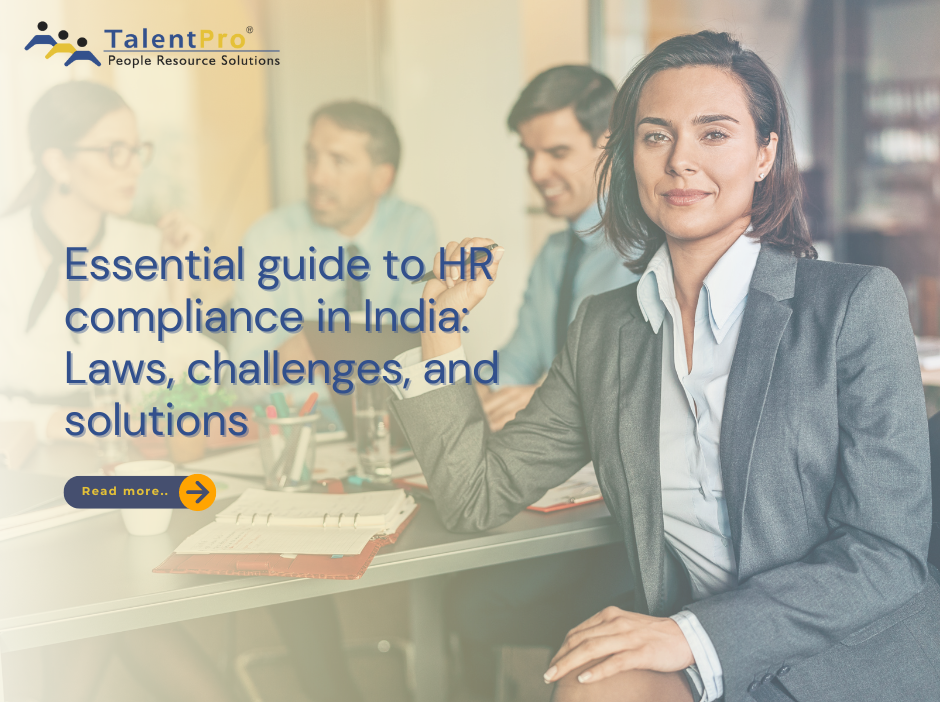Navigating the intricate landscape of HR compliance in India is crucial for every organization. Ensuring adherence to labour laws, workplace safety regulations, and fair employment practices is not only a legal requirement but also essential for fostering a positive work environment.
Definition of HR compliance
HR compliance involves adhering to laws, regulations, and company policies that govern how employees are treated. This encompasses aspects such as hiring practices, workplace safety standards, and equitable compensation. Essentially, it means following the rules to ensure fair and equal treatment of all employees.
Read more:(Statutory Compliances in HR – A Detailed List)
Understanding the significance of HR compliance is vital:
- Legal risks: Non-compliance can lead to serious legal repercussions for organizations. Violations of employment laws may result in substantial fines, lawsuits, or even business closure. For instance, failing to comply with wage and hour laws regarding overtime pay can incur severe penalties.
- Employee rights & trust: Adhering to labour laws demonstrates a commitment to upholding employee rights, ensuring equal opportunities, and providing a safe work environment. This fosters trust among employees, who are more likely to view their employer favourably when they feel their rights are respected and their well-being is valued.
- Positive work culture: Maintaining HR compliance helps cultivate a positive work culture rooted in transparency, fairness, and respect for individual rights. Employees are more likely to engage productively and feel satisfied in an environment where compliance is a priority.
Key elements of an HR compliance checklist
Key components of an effective HR compliance checklist include:
- Employment laws: Understanding and adhering to state and local employment laws governing areas such as wages, hours worked, and anti-discrimination practices.
- Workplace safety: Implementing measures to ensure a safe and healthy work environment, including compliance safety and health administration regulations.
- Employee relations: Establishing clear policies and procedures for handling grievances, disciplinary actions, and employee relations issues in a fair and consistent manner.
- Documentation: Maintaining accurate records related to hiring, payroll, benefits, and employee performance to ensure compliance with record-keeping requirements.
By proactively addressing these elements, organizations can mitigate risks, build a supportive workplace culture, and safeguard their operations while promoting employee trust and well-being.
Managing HR compliance in the workplace involves implementing effective strategies to ensure adherence to laws, regulations, and company policies. Here are some key approaches:
Importance of policies
Clear communication of workplace policies is fundamental. Policies should cover areas such as workplace safety, discrimination laws, and employment regulations. These policies can be disseminated through employee handbooks, company intranet systems, or posted in common areas. Regular updates and reminders about policy changes are crucial to keep employees informed.
Training on compliance procedures
Regular training sessions are essential to educate employees about HR compliance. These sessions can be conducted by HR staff or external consultants specializing in HR management and compliance. Training topics may include workplace safety protocols, anti-discrimination policies, and ethical behaviour standards. Interactive workshops or online modules can provide comprehensive guidance.
Implementation of monitoring systems
Effective monitoring systems are necessary to uphold workplace compliance standards. These systems help in tracking policy adherence, identifying areas for improvement, and addressing potential violations promptly. Examples include regular audits of employee files to ensure accuracy and completeness, monitoring hours worked to comply with payroll regulations, and overseeing hiring processes to prevent discrimination.
Maintaining HR compliance is essential for preventing legal disputes, fines, and reputational damage. Compliance with employment regulations is essential for mitigating risks, fostering a positive work environment, and building trust with your employees.
By implementing these measures, TalentPro proactively manage HR compliance, mitigate risks, and foster a workplace culture that prioritizes fairness, transparency, and employee well-being.










